Often called the “sunshine vitamin”, this post highlights 5 top vitamin D supplements along with some important things to know including, benefits, the best form of D, how to tell if you may be deficient, and tips for safe supplementation and maximum absorption.

Let’s start by taking a look at why this vitamin is so unique and important.
The ideal way to get vitamin D is for your body to manufacture it by absorbing the suns rays through your skin. Certain foods supply vitamin D as well, such as:
- fatty fish including salmon, mackerel, tuna and sardines, and cod liver oil
- organ meat such as beef liver
- egg yolks
- mushrooms (higher sources are maitake and portabella)
- fortified foods such as milk, various dairy products and breakfast cereal
Getting adequate vitamin D from these sources can be a challenge with modern day lifestyles. Factors like spending less time outside, the seasons where we live, cloud coverage and air pollution, sunscreen use, and skin color all affect how much sunlight and the types of rays that actually get absorbed into our skin.
Plus the types of unfortified foods that naturally contain vitamin D are not typically consumed in the modern day diet, and the foods that are artificially fortified contain dairy and gluten which come with their own set of health problems. On top of that, food sources of vitamin D are slim for vegetarians and vegans. Yet vitamin D is essential for optimal health.
Why is Vitamin D Necessary and What are the Benefits?
Vitamin D is a fat-soluble vitamin (more on that in minute) that plays an important role by being converted into a hormone and having an effect on thousands of genes in your body. It acts as a chemical messenger playing an essential role in pretty much everything – from metabolism to immune system to growth and development to mood to making hundreds of disease-preventing enzymes and proteins.
Adequate vitamin D levels in the blood contributes to many important health benefits, including:
Bone health – D helps increase the absorption of calcium (which is why it is included in most calcium supplements) and phosphorus – both minerals important for bone health. Adequate levels of D may limit bone loss, reduce risk of fractures, and even improve recovery from fractures or broken bones.
Muscle Strength – Studies have shown adequate levels of D to help improve muscle growth and strength in adults. It may also reduce frailty and the risk of falls in elderly individuals.
Immune System Health – Vitamin D binds to receptors in immune cells, activating and strengthening them. Adequate levels of D reduces your risk of infections and autoimmune disease by allowing you to quickly and effectively fight off infectious disease before it can progress. Studies have shown that adequate levels of D may help lower the risk and even slow the progression of autoimmune diseases including Multiple Sclerosis (MS), Lupus, Rheumatoid Arthritis, and Diabetes.
Heart Health – Adequate vitamin D levels in the blood may improve heart health and reduce the risk of developing heart disease.
Mood Health – Adequate levels of vitamin D can increase serotonin levels in the brain, your feel-good hormone, and promote feelings of well-being. Some studies show that low levels of D may greatly increase the likelihood of depression and that supplementation has been effective in reducing symptoms for those with moderate-strong symptoms of depression.
Other benefits of adequate vitamin D levels include possible lowered risk of certain cancers, reduction of chronic pain, weight management, and promotion of healthy births.

What are Signs of Deficiency?
Vitamin D deficiency is one the most common nutrient deficiencies worldwide, with upwards of 40 percent of the US population showing low levels. And more recent research indicates that the previous recommended levels of vitamin D were on the low side, so the rate of deficiency is likely to be even higher.
As mentioned earlier, factors that may put you at risk for deficiency may include insufficient sun exposure, dark skin, being elderly, and limited vitamin D availability in the typical modern diet. Other factors may include a low fat diet, weight loss medications, steroids, and compromised absorption or gut imbalance.
D deficiency can be subtle and may take years or decades to surface and has been linked to the following:
- weakened immune system and autoimmune disease
- decreased done density
- skin issues such as eczema and psoriasis
- altered mood and depression
- increased risk of heart disease, diabetes and cancer
- dementia
Vitamin deficiency can also show up as fatigue, insomnia, back pain, joint pain (particularly of the wrists, ankles, shoulders, and shins), proximal muscle weakness, headache, and hair loss.
So how do you know whether your vitamin D levels are where they need to be?
The only way to find out is to have your levels tested by a healthcare professional.
And what are considered optimal levels of vitamin D?
What are Optimal Vitamin D Levels? (Plus Supplementation)
Depending on the source, vitamin D3 levels of 30 to 100 ng/mL are defined as normal, but if you’re going for optimal health, most of the research seems to point to keeping them around 60 to 90 ng/mL, which again, can only be determined by having your levels tested.
Should you choose to supplement, it’s important to note that there are two main forms of vitamin D:
- Vitamin D2 (ergocalciferol) – found in mushrooms
- Vitamin D3 (cholecalciferol) – found in animal foods
The Vitamin D3 form is much more effective at increasing blood levels of vitamin D than the vitamin D2 form, so that’s something important to keep in mind when looking for a high-quality supplement.
Going back to the fact that vitamin D is fat-soluble, this means that it gets absorbed in the lymph system, transported in the blood, and can be stored in the liver and fatty tissues for use as needed. That said, care needs to be exercised when using fat-soluble vitamins since toxic levels can build up when consumed in excessive amounts, including taking into account the amounts of these vitamins from each supplement you are taking.
For example, if you’re taking a high-quality calcium supplement it should contain some vitamin D but maybe not quite enough, so you’ll want to take that amount into account when choosing a separate vitamin D supplement to reduce the risk of overdoing it.
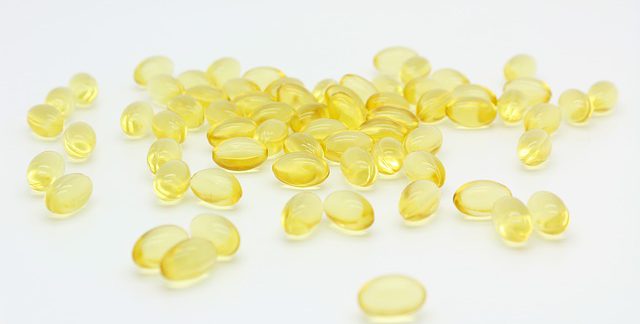
Again, depending on the source, there are different recommendations on how much D3 to supplement with and the range it comes in is broad, from 400 IU all the way up to 20,000 IU. The most recent research, and extensive research of experts is recommending a mid range of 2000 IU to 4000 IU per day for adults.
It’s not recommended to take more than 5,000 IU of vitamin D3 per day without the supervision of a physician and regular blood testing to keep tabs on your levels.
What are Some Ways to Optimize Vitamin D3 Absorption?
There are a few vitamins that work synergistically with vitamin D3, including Vitamin K2 which helps insure the calcium ends up in your bones, instead of in your arteries, as well as adequate levels of vitamin A and E, which you can get in a high-quality multivitamin. Magnesium, another common deficiency, may also be important for the function of vitamin D.
Another easy tip is to take your fat-soluble supplements, including vitamin D, with meals that contain healthy fats since they contain co-factors that can aid in absorption of these types of supplements.
For individuals who experience fat malabsorption, including leaky gut, Crohn’s, IBS, or have had your gall bladder removed, or have gluten sensitivity or Celiac disease, a digestive enzyme supplement that aids in the breakdown of proteins, fats, and starches can help with the absorption of your vitamin D supplement.
Vitamin D3 Drops vs. Soft Gels, Capsules, or Tablets?
Vitamin D3 comes in a variety of forms including liquid drops, soft gels, capsules, and tablets. I like to keep things as simple as possible for my body to absorb, so I tend to favor drops. That said, it’s important to make sure they are in a base of some kind of healthy fat like olive oil.
Drops are easy to use and allow you to have control of the amount you want to take. They can be used directly under your tongue, or the way I prefer is to add them to a bite of food that contains healthy fats like nut butters, coconut oil, avocado, eggs, or fish. The source of drops generally come from lanolin from sheep’s wool, and sometimes the plant-source lichen.
When it comes to soft gels, capsules, and tablets, sources of D3 usually include lanolin from sheep’s wool, or fish liver oil. However, there are some high-quality vegetarian or vegan forms of vitamin D3 in capsule and tablet options, mainly from lichen.
Now that we’ve gone over all the important details, let’s take a look at the top 5 vitamin D supplements…
Vitamin D Supplements – 5 For You
Live Wise Naturals Vitamin D3 with K2 Liquid Drops
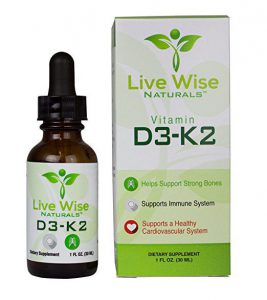
Highlights
- Liquid vitamin D3 with vitamin K in a base of organic olive oil for optimal delivery
- Available in unflavored or peppermint flavored
- Easy to use dropper so you can adjust dosage accordingly
- 930 servings at 1,208 IU per drop
- Free of common allergens including, gluten, dairy, egg, fish, peanuts, wheat, corn, added sugars, coloring, artificial flavors, dyes, or preservatives, and non-GMO
- Multiple reviews of people sharing their vitamin D test results before and after this supplement who were able to bring their vitamin D up to optimal levels
Pure Therapeutics Vegan D3 + K2
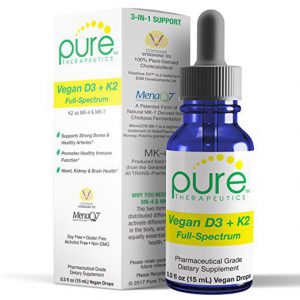
Highlights
- Pharmaceutical grade full spectrum liquid vitamin D3 and K2 as MK-4 and MK-7 in a base of coconut oil, olive oil, and d-alpha tocopherol for optimal absorption
- Vegan (sourced from lichen)
- Flavorless and odorless
- Easy to use dropper so you can adjust dosage accordingly
- 90 servings at 5,000 IU per 5 drops
- GMP-certified, non-GMO, and free of wheat, gluten, corn, yeast, soy, animal or dairy products, fish, shellfish, peanuts, tree nuts, egg, artificial colors and sweeteners, and preservatives
NOW Extra-Strength Liquid Vitamin D3 1000 IU
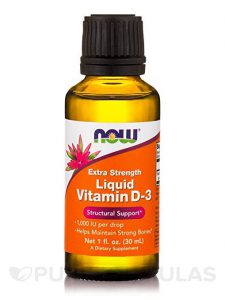
Highlights
- Liquid vitamin D3 in a base of MCT oil from coconut/palm kernel oil for optimal delivery
- Flavorless and odorless
- Metered dispenser to avoid overdosing, while allowing you to choose how many drops you want (requires a bit more patience than glass/bulb droppers)
- About 1071 servings at 1,000 IU per drop
- GMP (Good Manufacturing Process) certified and not manufactured with yeast, wheat, gluten, soy, milk, egg, fish or shellfish ingredients
Garden of Life Vitamin Code Raw D3 2000 IU
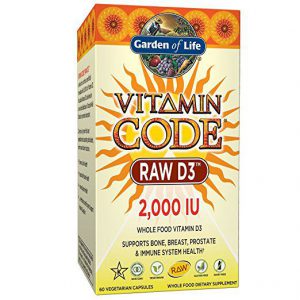
Highlights
- Whole food vitamin D3 including a raw organic fruit & vegetable blend and raw probiotic & enzyme blend for optimal absorption
- Easy to swallow vegetarian capsules
- 60 or 120 capsules containing 2,000 IU each
- Non-GMO, raw, vegetarian, gluten-free and dairy-free, with no binders or fillers
- Reviews of people sharing their vitamin D test results before and after this supplement who were able to bring their vitamin D up to optimal levels
MegaFood Vitamin D3 1,000 IU
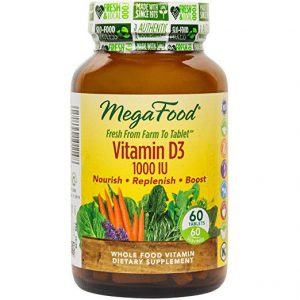
Highlights
- FoodState vitamin D3 with immune health blend and nourishing whole food blend for optimal absorption
- Gentle on the stomach vegetarian tablets
- 30-90 tablets containing 1,000 IU each
- Vegetarian, non-GMO, free of gluten, dairy and soy, and certified kosher
- Solid reputation for being an industry leader for high-quality whole food supplements since 1973
Bonus Product: Garden of Life mykind Organics Vegan D3
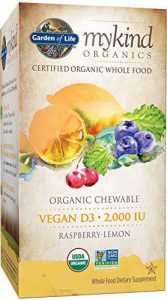
Highlights
- Vegan D3 from lichen with a certified organic food blend and 10 mushroom blend for optimal absorption
- 30 raspberry lemon chewables containing 2,000 IU each
- Certified organic, vegan and non-GMO
- Great alternative to swallowing pills
I hope you found this helpful when it comes to choosing the vitamin D supplement that is right for you!
